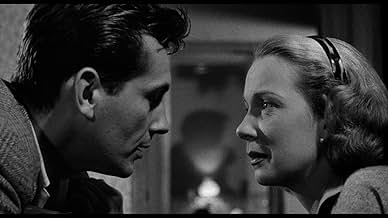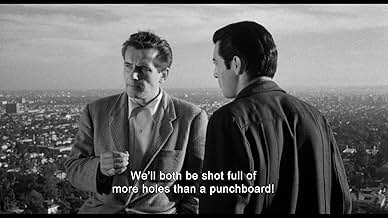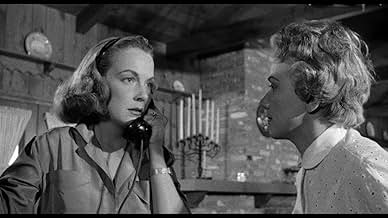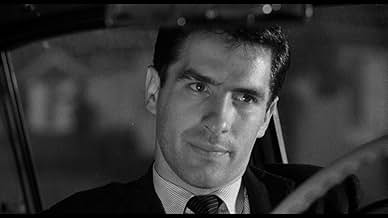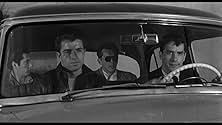IMDb रेटिंग
6.3/10
1.2 हज़ार
आपकी रेटिंग
अपनी भाषा में प्लॉट जोड़ेंA group of convicted felons take over a suburban house to escape the ongoing police manhunt, turning the life of the family living there into a nightmare.A group of convicted felons take over a suburban house to escape the ongoing police manhunt, turning the life of the family living there into a nightmare.A group of convicted felons take over a suburban house to escape the ongoing police manhunt, turning the life of the family living there into a nightmare.
Eddie Marr
- Captain Cole
- (as Edward Marr)
Stanley Andrews
- Mr. Courtier
- (बिना क्रेडिट के)
Tom Coleman
- Reporter
- (बिना क्रेडिट के)
Oliver Cross
- Detective
- (बिना क्रेडिट के)
Roy Damron
- Detective
- (बिना क्रेडिट के)
Charles Herbert
- Steven Courtier
- (बिना क्रेडिट के)
फ़ीचर्ड समीक्षाएं
THE NIGHT HOLDS TERROR is an interesting thriller/film noir entry for various reasons. Yes, it bears a strong similarity to THE DESPERATE HOURS, but that's because both were inspired by the same true (and sensational) story. Proving which one went into production first might be difficult. But really, it doesn't matter, because unlike the Hollywood sheen of THE DESPERATE HOURS, this odd little film has many gritty aspects and colorings and transcends its low budget.
John Cassavetes is always great to watch, even in a lesser picture. Here, while he rarely truly shines, he manages to keep tightly wound like a coiled spring, with his menacing glare and occasional flashes of violence. Vince Edwards is actually nowhere near as good here as he was playing similar hoods in MURDER BY CONTRACT, CITY OF FEAR and THE KILLING, though it's an acceptably menacing performance.
What really makes THE NIGHT HOLDS TERROR is a constant reliance on real locations. I couldn't spot one studio set in the entire picture; every interior seems to be in a real place (Cassavetes' modern hilltop home and the Courtiers' kitchy suburban one, police stations, telephone switching centers, the Mojave desert, etc.). There is even one standout sequence where the captors' car careens through the desert, photographed by what appears to be a cameraman barely holding onto the hood of the car. No rear screen here, and this is several years before the famed from-the-hood Venice driving sequence in TOUCH OF EVIL.
And the pace of the picture is practically amphetamine-charged. If the camera isn't moving, the cast always is, with constant dialogue shot through with tension. This is a strong, underrated thriller, and while hardly a perfect masterpiece, it's definitely superior to stagier hostage dramas of the period and well worth tracking down.
John Cassavetes is always great to watch, even in a lesser picture. Here, while he rarely truly shines, he manages to keep tightly wound like a coiled spring, with his menacing glare and occasional flashes of violence. Vince Edwards is actually nowhere near as good here as he was playing similar hoods in MURDER BY CONTRACT, CITY OF FEAR and THE KILLING, though it's an acceptably menacing performance.
What really makes THE NIGHT HOLDS TERROR is a constant reliance on real locations. I couldn't spot one studio set in the entire picture; every interior seems to be in a real place (Cassavetes' modern hilltop home and the Courtiers' kitchy suburban one, police stations, telephone switching centers, the Mojave desert, etc.). There is even one standout sequence where the captors' car careens through the desert, photographed by what appears to be a cameraman barely holding onto the hood of the car. No rear screen here, and this is several years before the famed from-the-hood Venice driving sequence in TOUCH OF EVIL.
And the pace of the picture is practically amphetamine-charged. If the camera isn't moving, the cast always is, with constant dialogue shot through with tension. This is a strong, underrated thriller, and while hardly a perfect masterpiece, it's definitely superior to stagier hostage dramas of the period and well worth tracking down.
Gritty little suspenser that holds interest throughout. Writer-director Andrew Stone's and wife Virginia's reputation rests on a documentary-style approach to film-making. Making a movie about people on board a sinking ship?-- then sink an actual ship, The Last Voyage (1958). I believe it was Andrew Sarris who observed that it was a good thing they never made a film about the end of the world!
There's a lot of that documentary approach in this low-budgeter taken from an actual kidnapping case of the period. Kidnapping was much in the news in 1953 with the sensational abduction for ransom of little Bobby Greenlease, of Kansas City, I believe. And, of course, then as now, screen-writers love to chase the headlines of the day. So it's no surprise that several of these plot-lines turned up at about the same time, including the rather eerie Big House, USA (1955).
Here the screenplay recreates the abduction of the offspring of a wealthy LA-area family, Gene Couture. What makes the movie work is the inspired casting (probably a happy accident) that brings together three fast-rising young actors-- a sullen Vince Edwards, a moody John Cassavetes, and an appealing Jack Kelly as the victim. You really get the feeling from the former two-- who look edgy and act even edgier-- that anything can happen at any time. Together as the lead abductors, they're little short of the proverbial dynamite. When they take Kelly into the desert, you get the feeling he's a dead duck for sure.
Then too, the Stone's insistence on real suburban locations lends the proceedings a look and feel different from the usual. The procedural part gets kind of draggy as the cops enter the case and was likely inspired by the police mega-hit of the day, Dragnet. But at least it's consistent with the over-all documentary tone. Some buffs see the movie as noir. I don't, taking it instead as a particularly effective example of the "home invasion" genre that was also popular at the time. But however you cut it, this is still a darn good little 90 minute nail-biter.
There's a lot of that documentary approach in this low-budgeter taken from an actual kidnapping case of the period. Kidnapping was much in the news in 1953 with the sensational abduction for ransom of little Bobby Greenlease, of Kansas City, I believe. And, of course, then as now, screen-writers love to chase the headlines of the day. So it's no surprise that several of these plot-lines turned up at about the same time, including the rather eerie Big House, USA (1955).
Here the screenplay recreates the abduction of the offspring of a wealthy LA-area family, Gene Couture. What makes the movie work is the inspired casting (probably a happy accident) that brings together three fast-rising young actors-- a sullen Vince Edwards, a moody John Cassavetes, and an appealing Jack Kelly as the victim. You really get the feeling from the former two-- who look edgy and act even edgier-- that anything can happen at any time. Together as the lead abductors, they're little short of the proverbial dynamite. When they take Kelly into the desert, you get the feeling he's a dead duck for sure.
Then too, the Stone's insistence on real suburban locations lends the proceedings a look and feel different from the usual. The procedural part gets kind of draggy as the cops enter the case and was likely inspired by the police mega-hit of the day, Dragnet. But at least it's consistent with the over-all documentary tone. Some buffs see the movie as noir. I don't, taking it instead as a particularly effective example of the "home invasion" genre that was also popular at the time. But however you cut it, this is still a darn good little 90 minute nail-biter.
A gritty kidnapping caper (complete with no-nonsense, "Dragnet"-style narration) that turns into a documentary-style police procedural as the cops begin to close in. After a sensational beginning--featuring a carjacking, a home invasion, and a very terrified family--the movie begins to lose some steam in the second half (there are lots of shots of hard-working, real-life police dispatchers and telephone operators), but you'll still want to hang on till the end. With a very young John Cassavetes and a pre-"Ben Casey" Vince Edwards as two of the thugs. Based on actual events.
These types of films seemed to be quite common in the 1950s. Drivers making the foolish mistake of picking up the worst possible type of hitch-hiker--a criminal. One who might take him hostage or kill him at any moment. A very real fear of the possible.
This film feels like a mix of THE HITCH-HIKER and THE DESPERATE HOURS but isn't quite on par with either. Unlike those, this feels like a Made For TV film. The Narration is very much a negative and will probably make many laugh due to its dire seriousness.
But the characters in this film are well-played and certainly entertaining enough to make this film an enjoyable ride. Especially good are Hildy Parks as the terrorized wife who won't stand for it and Jack Kelly as her husband who is thinking only of his family's welfare. John Cassavetes is also good in his role as the mastermind criminal. There's some terrific cinematography in the film featuring scenes out in the desert and the climatic ending in the rain.
This film feels like a mix of THE HITCH-HIKER and THE DESPERATE HOURS but isn't quite on par with either. Unlike those, this feels like a Made For TV film. The Narration is very much a negative and will probably make many laugh due to its dire seriousness.
But the characters in this film are well-played and certainly entertaining enough to make this film an enjoyable ride. Especially good are Hildy Parks as the terrorized wife who won't stand for it and Jack Kelly as her husband who is thinking only of his family's welfare. John Cassavetes is also good in his role as the mastermind criminal. There's some terrific cinematography in the film featuring scenes out in the desert and the climatic ending in the rain.
I have often confounded NIGHT OF TERROR with CRY TERROR, because both have "terror" in the title, and also because both are made by the same director; and let's admit that both stories are quite close. Hoodlums against the common law abiding citizen living in the suburb. John Cassavetes and Vince Edwards literally steal the show because of their performances. This story could have been perfect for a seventies or even eighties film, partly because inspired from true events that occured in february 1953. It is predictable, easy to know how it will end, but just enjoy the directing and acting too. Useless to insist on this same topic as DESPERATE HOURS.
क्या आपको पता है
- ट्रिवियाBased on a true story that happened in February 1953.
- गूफ़In the extended scene where Robert Batsford is in a telephone booth inside the Thrifty Drug Store, a member of the camera crew's reflection can be seen on the glass side throughout.
- क्रेज़ी क्रेडिटThe five lead actors not only receive optical billing in the opening credits, but the narrator speaks both their actual names and their characters' names.
- कनेक्शनFeatured in Los Angeles Plays Itself (2003)
- साउंडट्रैकEvery Now and Then
Written by Virginia L. Stone (as Virginia Stone)
टॉप पसंद
रेटिंग देने के लिए साइन-इन करें और वैयक्तिकृत सुझावों के लिए वॉचलिस्ट करें
- How long is The Night Holds Terror?Alexa द्वारा संचालित
विवरण
- चलने की अवधि
- 1 घं 26 मि(86 min)
- रंग
- पक्ष अनुपात
- 1.85 : 1
इस पेज में योगदान दें
किसी बदलाव का सुझाव दें या अनुपलब्ध कॉन्टेंट जोड़ें

